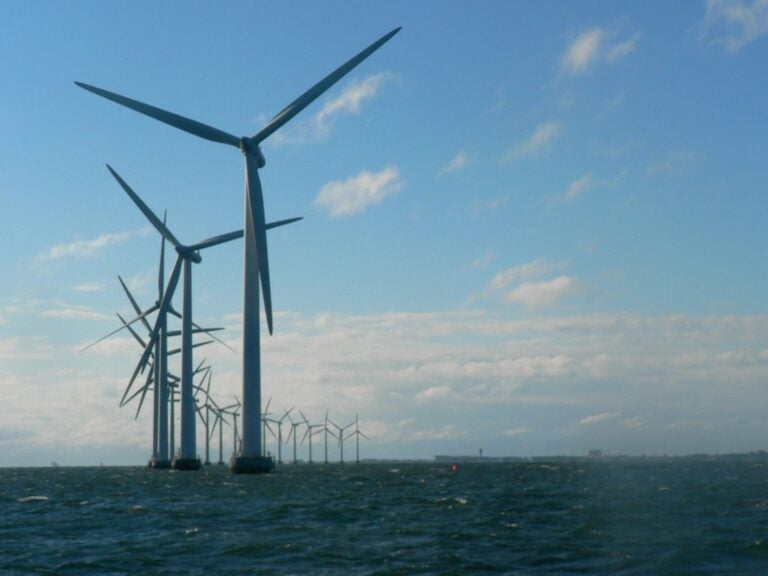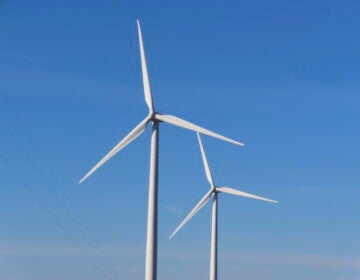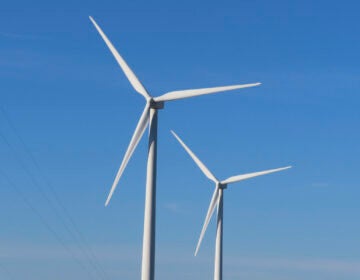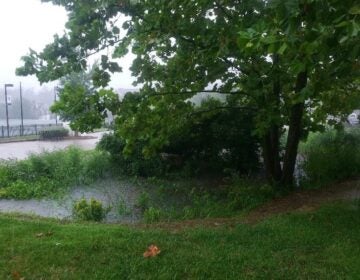New Jersey to fund research on offshore wind impacts on whales
The new funding will help researchers evaluate the impact of offshore wind activities on whales, birds and the marine ecosystem.
Listen 1:14
New funding in N.J. will be used to research offshore wind turbines, like these in Copenhagen, Denmark, and whether marine mammals are impacted by activities associated with turbine construction projects. (Courtesy of Willett Kempton)
This story is part of the WHYY News Climate Desk, bringing you news and solutions for our changing region.
From the Poconos to the Jersey Shore to the mouth of the Delaware Bay, what do you want to know about climate change? What would you like us to cover? Get in touch.
Gov. Phil Murphy’s administration on Monday announced nearly $3.7 million in funding to research offshore wind and whether marine mammals are impacted by activities associated with turbine construction projects.
Offshore wind development has been a top priority of the administration in an effort to address climate change and reach 100% clean energy by 2035. However, the initiative has received pushback from some political and community leaders who believe survey activities related to offshore wind projects may harm whales and other species.
“It’s imperative that we not only protect the interests of our ratepayers but safeguard the vitality of our marine ecosystems as well,” said Christine Guhl-Sadovy, president of the New Jersey Board of Public Utilities, in a statement.
The new funding will support the state’s ongoing Research and Monitoring Initiative, which to date has received $13 million from the BPU’s second offshore wind energy solicitation. In January, the state approved two offshore wind projects that will generate 742 megawatts of electricity, power up to 1.8 million homes and contribute more than $3 billion to the local economy.
Last year, there were numerous calls for a moratorium on offshore wind development from local political and community leaders who voiced concern about a string of whale strandings in New Jersey. The National Oceanic and Atmospheric Administration, as well as other scientists, said vessel strikes have caused an uptick in whale deaths since 2016 — not offshore wind activity.
The funding announced this week aims to ensure potential impacts to whales and other wildlife from offshore wind activities will be mitigated.
The dollars will help the NOAA lead aerial surveys in coastal New Jersey to identify whale activity from New York to North Carolina.
Rutgers University researchers also will receive funding to use satellite transmitters to track whale behaviors near offshore wind lease areas and determine any potential risks to the marine mammals. The university also will study the effects offshore wind turbines have on the Mid-Atlantic cold pool — an oceanographic pattern crucial to marine ecosystems and New Jersey’s scallop and flounder fisheries.
In addition, the new funding will help expand the state’s bird and bat tracking system and launch a study focused on sea turtle behavior and health, in an effort to assess species’ activities near offshore wind lease areas.
“Development of offshore wind energy is critical to mitigating and responding to the worsening impacts of climate change,” said Shawn M. LaTourette, commissioner of the New Jersey Department of Environmental Protection, in a statement. “These projects continue to advance our collection of important baseline scientific information that is necessary to ensure the responsible development and operation of offshore wind facilities.”
However, groups that oppose offshore wind projects say they believe the research wouldn’t come soon enough to mitigate any potential environmental impacts.
Save Long Beach Island is a coalition of residents who have advocated against offshore wind development near their community. The organization is in favor of mitigating the effects of climate change but doesn’t believe offshore wind is always the answer. In addition to concerns about impacts on military activity and vessel traffic, the group’s leader, Bob Stern, is concerned about marine mammal migration.
“Once the turbines are constructed and operating, these studies have little value because there’s nothing you can do to mitigate the problems you find,” Stern said. “To do this now after you make the decision on the project just seems to us to make little sense at all.”
However, environmental advocacy groups such as the New Jersey League of Conservation Voters say climate change itself is a bigger threat to wildlife. The organization’s executive director, Ed Potosnak, said the new funding will help ongoing research that aims to better understand marine ecosystem behaviors.
“[For example], the migratory patterns of marine mammals, it is important to know when to install the footings and the wind turbines themselves, to ensure we’re doing that in the offseason when the species are not in the area,” he said. “So having funding in those areas is really beneficial.”

Get daily updates from WHYY News!
WHYY is your source for fact-based, in-depth journalism and information. As a nonprofit organization, we rely on financial support from readers like you. Please give today.







